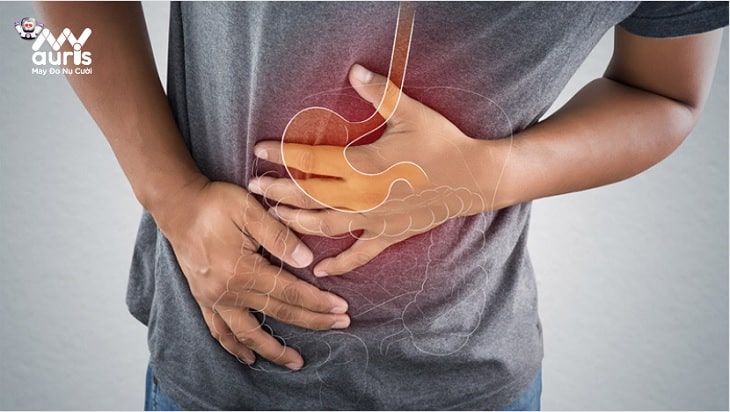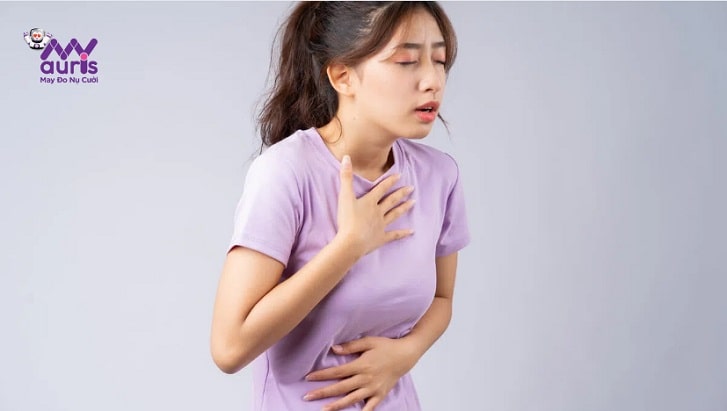Gastroesophageal reflux is a condition in which stomach fluid frequently flows back up into the esophagus, which can cause esophageal ulcers. However, gastric reflux disease can progress and leave damage if not examined and treated promptly. So what are the symptoms of gastric reflux, thereby helping you have a more scientific treatment plan and lifestyle change.
Quick understanding of gastric reflux disease
Gastroesophageal reflux is a phenomenon in which fluid in the stomach flows back up into the esophagus. The stomach will secrete gastric juice, which is acidic to help digest food. However, the wall of the esophagus is not designed to resist the acidity of stomach contents. Therefore, gastric reflux causes inflammation of the esophagus, leading to a burning sensation and discomfort. In the long term, it causes damage to the esophagus.
For people with this disease, reflux may be due to effects on the lower esophageal sphincter. Furthermore, this sphincter is a ring located between the esophagus and the stomach. Normally, the esophageal sphincter opens and closes rhythmically, preventing stomach contents from flowing up into the esophagus.

Gastric reflux can also be related to hiatal hernia. However, hiatal hernia and gastroesophageal reflux are not synonymous and hiatal hernia is not always accompanied by reflux.
The following subjects are at risk of gastroesophageal reflux disease:
- People with hiatal hernia;
- Women who are pregnant, especially in the last months of pregnancy. The fetus creates additional pressure on the stomach, but this is only temporary.
- People who are obese or overweight;
- In people over 50 years old, the esophageal sphincter is less effective and can cause gastroesophageal reflux
- Scleroderma;
- Runners or divers often experience gastroesophageal reflux during exercise;
- Smoking can increase the risk of gastroesophageal reflux.
Shows of gastric reflux in the esophagus
Symptoms of gastric reflux often appear after meals or while lying down. It will cause a burning sensation in the sternum and a bitter taste in the mouth. Reflux can lead to the following symptoms:
Symptoms of belching, heartburn, heartburn
Frequent belching is a sign of gastroesophageal reflux disease
Heartburn is a burning feeling from the stomach, below the sternum and then pushed up into the throat;
Heartburn is often accompanied by symptoms of heartburn and belching, and leaves a sour taste in the mouth.
With these Accompanying symptoms often appear when eating a full meal, or when the stomach is full and has indigestion, especially at night.
Feeling of nausea, vomiting
Regurgitation of acid into the throat or mouth, which will stimulate the throat causing a feeling of nausea. This condition can occur at any time, but most commonly appears at night, possibly due to sleeping position because when the parasympathetic nervous system is more active.

Epigastric chest pain
You will have a feeling of pressure, tightness in the chest and radiating to the back and arms. The main cause is that stomach acid reflux stimulates nerve fiber endings on the surface of the esophageal mucosa. At this time, the pain sensor will give a signal so you can easily recognize it as chest pain.
However, this symptom can confuse you with cardiovascular diseases and lung diseases when they have the same symptoms.
Symptoms of difficulty swallowing
Swelling Frequent gastroesophageal reflux causes edema, swelling and narrows the diameter of the esophagus. Therefore, the patient will have a feeling of difficulty swallowing and a lump in the throat.
Hoarseness and coughing
Because the vocal cords are damaged when exposed to acidic gastric juices in the stomach. Furthermore, people with gastroesophageal reflux disease will have a hoarse voice due to swelling of the vocal cords, difficulty speaking, and over time a cough due to inflammation flowing down the bronchial larynx.
Excessive salivation in the oral cavity
Excessive salivation in the oral cavity is a self-protection mechanismof the body in the mouth area to neutralize the amount of acid rising up.
What are the harmful effects of gastric reflux disease?
The stomach has the function of storing and digesting food. To do the job of feeding, the stomach needs to secrete a very strong acid, hydrochloric acid HCl, which helps activate the enzyme pepsin – which plays a role in protein digestion. Thanks to that, the stomach has a solid protective barrier to prevent acids and enzymes from returning to “corrode” the stomach. However, other agencies often do not have this protection mechanism. Therefore, when exposed to gastric juice, the mucosa is quickly damaged and corroded, followed by edema, inflammation, scarring and adhesion, and worse, cancer. Specifically:
- Esophageal ulcers” Ulcers can cause bleeding, pain and difficulty swallowing;
- Esophageal stenosis and scarring: when the damage continues, it can leave scars that cause the esophagus to block the flow of food. eat.
- Esophageal cancer: There are two main types of esophageal cancer: adenocarcinoma and squamous cell carcinoma. Of these, the main risk factor for esophageal cancer is Barrett’s esophagus. It is estimated that 1 in 10 – 20 people with Barrett’s esophagus have cancer esophagus after 10 – 20 years.

Building a scientific lifestyle for people with gastric reflux
Treatment of gastric reflux includes lifestyle changes, dietary changes, medical and surgical treatment, and other methods.
However, non-drug treatment is always encouraged by doctors. A reasonable lifestyle or scientific diet will reduce the frequency of gastroesophageal reflux.
- Chia Eat less frequently at main meals for people with signs of gastroesophageal reflux;
- Choose alkaline foods that can neutralize acids such as starchy foods (bread, oats) or easily digestible proteins.
- Limit foods that cause diarrhea.Useful for increasing acid secretion or stimulating the lower esophageal sphincter such as fruits with high acid content (lemon, orange, pineapple,…).
- Reduce the use of fatty foods and spicy foods;
- Relaxing the body to avoid stress can clearly reduce symptoms of gastric reflux.
The above are the decoding of gastric reflux symptoms. Hopefully this article will provide you with the necessary information. If you have any questions, please contact us via Fanpage or come directly to the dentist for thorough and detailed advice.
Kim Dung





